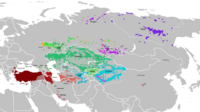Karluk languages
Appearance
| Karluk | |
|---|---|
| Qarluq, Southeastern Turkic, Turkestan Turkic | |
| Geographic distribution | Central Asia |
| Linguistic classification | Turkic
|
Early forms | |
| Subdivisions |
|
| Language codes | |
| Glottolog | uygh1241 |
 Uzbek Uyghur Ili | |
The Karluk or Qarluq languages are a sub-branch of the Turkic language family that developed from the varieties once spoken by Karluks.[1]
Many Middle Turkic works were written in these languages. The language of the Kara-Khanid Khanate was known as Turki, Ferghani, Kashgari or Khaqani. The language of the Chagatai Khanate was the Chagatai language.
Karluk Turkic was once spoken in the Kara-Khanid Khanate, Chagatai Khanate, Timurid Empire, Mughal Empire, Yarkent Khanate and the Uzbek-speaking Khanate of Bukhara, Emirate of Bukhara, Kokand Khanate, Khiva Khanate.
Classification
Languages
- Uzbek – spoken by the Uzbeks; approximately 44 million speakers [2]
- Uyghur – spoken by the Uyghurs; approximately 8–11 million speakers [3]
- Ili Turki – moribund language spoken by Ili Turkis, who are legally recognized as a subgroup of Uzbeks; 120 speakers and decreasing (1980)
- Chagatai – extinct language which was once widely spoken in Central Asia and remained the shared literary language there until the early 20th century.
- Karakhanid – literary language of the Kara-Khanid Khanate that is considered a standard form of Middle Turkic.
- Khorezmian – literary language of the Golden Horde that is considered a preliminary stage of the Chagatai language.
| Proto-Turkic | Common Turkic | Karluk | Western | |
| Eastern |
Glottolog v4.8 refers to the Karluk languages as "Turkestan Turkic" and classifies them as follows:
| Turkestan Turkic |
| ||||||||||||||||||
References
- ^ Austin, Peter (2008). One Thousand Languages: Living, Endangered, and Lost. University of California Press. p. 145. ISBN 978-0-520-25560-9.
- ^ Uzbek at Ethnologue (18th ed., 2015) (subscription required) Northern at Ethnologue (18th ed., 2015) (subscription required) Southern at Ethnologue (18th ed., 2015) (subscription required)
- ^ "Uyghur". Ethnologue. Retrieved 7 December 2022.

